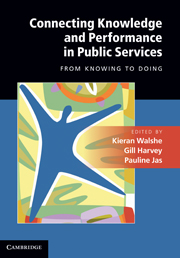Book contents
- Frontmatter
- Contents
- List of figures
- List of tables
- List of boxes
- Notes on contributors
- Foreword
- 1 Introduction: knowledge and performance – theory and practice
- 2 Knowledge from inspection: external oversight and information to improve performance
- 3 How is information used to improve performance in the public sector? Exploring the dynamics of performance information
- 4 Citizens, users or consumers: the voice of the public and its influence on improving performance
- 5 Competition and choice: the place of markets in connecting information and performance improvement
- 6 The role of corporate governance and boards in organisational performance
- 7 Change at the top: connecting political and managerial transitions with performance
- 8 The role of leadership in knowledge creation and transfer for organisational learning and improvement
- 9 Process Improvement and Lean Thinking: using knowledge and information to improve performance
- 10 Using evidence: how social research could be better used to improve public service performance
- 11 Absorptive capacity: how organisations assimilate and apply knowledge to improve performance
- 12 Knowing through doing: unleashing latent dynamic capabilities in the public sector
- 13 Conclusions: a puzzle, three pieces, many theories and a problem
- Index
Foreword
Published online by Cambridge University Press: 05 July 2011
- Frontmatter
- Contents
- List of figures
- List of tables
- List of boxes
- Notes on contributors
- Foreword
- 1 Introduction: knowledge and performance – theory and practice
- 2 Knowledge from inspection: external oversight and information to improve performance
- 3 How is information used to improve performance in the public sector? Exploring the dynamics of performance information
- 4 Citizens, users or consumers: the voice of the public and its influence on improving performance
- 5 Competition and choice: the place of markets in connecting information and performance improvement
- 6 The role of corporate governance and boards in organisational performance
- 7 Change at the top: connecting political and managerial transitions with performance
- 8 The role of leadership in knowledge creation and transfer for organisational learning and improvement
- 9 Process Improvement and Lean Thinking: using knowledge and information to improve performance
- 10 Using evidence: how social research could be better used to improve public service performance
- 11 Absorptive capacity: how organisations assimilate and apply knowledge to improve performance
- 12 Knowing through doing: unleashing latent dynamic capabilities in the public sector
- 13 Conclusions: a puzzle, three pieces, many theories and a problem
- Index
Summary
When the builder of the world's first steamship, Henry Bell, sent the British Admiralty details about his ideas for this epoch-making maritime development, their naval Lordships treated the information with ‘cold neglect’, seeing steam propulsion as irrelevant to the future of naval warfare (Mitchell 1971: 131). When information emerged about a near-meltdown at the US Three Mile Island nuclear power plant in 1978, engineers and managers at the Soviet Chernobyl nuclear plant dismissed it as a product of capitalism's inherent tendency to sacrifice safety for profit (as compared to in the Soviet Union, where no nuclear accidents were ever reported), and declared that their own installation could have nothing to learn from the US failure (Hawkes et al. 1986: 110). When, only a few years after the collapse of the Soviet Union, Tony Blair's New Labour Government in Britain adopted a system of targets to apply to every part of the public services, well-known problems of performance target systems – ratchet effects, threshold effects, output distortion – that had been carefully documented by Soviet historians and economists since the 1950s were wholly ignored, only to be rediscovered the hard way as all of those problems emerged in the British target system (Hood 2006).
So can knowledge and action be effectively brought together in government and public services? It's easy to slip into earnest clichés about the importance of evidence-based policy or better statistics for good governance and to gloss over the formidable social and cultural gulf that so often yawns between ‘knowers’ and ‘doers’.
- Type
- Chapter
- Information
- Connecting Knowledge and Performance in Public ServicesFrom Knowing to Doing, pp. xv - xviiiPublisher: Cambridge University PressPrint publication year: 2010



